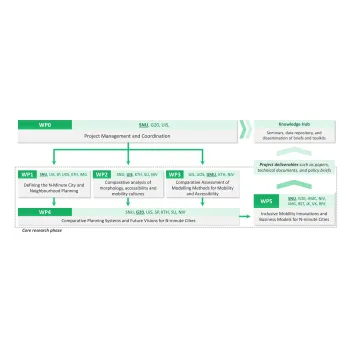Beyond 15-Minutes / B15M
Beyond 15-Minutes: Embracing an Adaptive and Inclusive N-Minute City

© Beyond 15-Minutes
- Category
- Project
- Call
- DUT Call 2024
- Duration
- –
- Project coordinator
- Seoul National University
The B15M project is to reimagine the N-minute city not as a fixed metric, but as a living, adaptive framework shaped by the evolving rhythms of urban life. Today’s cities face multiple pressures, accelerating digital transformation, shifting mobility patterns, growing inequality, and demographic transitions such as aging populations. This project aims to ensure that all residents, regardless of background, have inclusive and equitable access to essential services and urban amenities.
The project addresses five main challenges: the lack of context-sensitive thresholds that reflect regional specificities; the ways emerging technologies and mobility innovations reshape proximity, belonging, and everyday access; policy frameworks that insufficiently account for the lived experiences of marginalized groups; the dominance of car-centric systems that undermine sustainable and inclusive alternatives; and fragmented knowledge exchange, highlighting the need for a transnational research network to foster adaptive, human-scale urban ecosystems.
The B15M project will address these challenges through a phased multi-scalar strategy combining theory, empirical research, modelling, and applied innovation. Comparative case studies in Incheon (Korea), Stockholm (Sweden), and the Stavanger Region (Norway) provide diverse contexts for developing and testing adaptive N-minute thresholds. WP1 defines spatial typologies and context-sensitive indicators grounded in demographic and digital realities. WP2 examines how residents, particularly marginalized groups, perceive and navigate neighbourhoods, ensuring the framework reflects lived experience. WP3 integrates cumulative-opportunity metrics, gravity-based models, and agent-based modelling to simulate accessibility under scenarios such as telework or AI-driven mobility. WP4 develops inclusive planning visions and policy pathways, supported by international workshops and backcasting. WP5 pilots applied innovations with partners like Hyundai, SITEPLANNING, and municipal governments, testing shared mobility models and last-mile services. Through this sequence of research processes, the project will contribute to shaping future cities that are sustainable, equitable, and scalable.
The B15M project will provide practical tools, typologies, and policy frameworks that redefine the N-minute city for various contexts in South Korea and Northern Europe. Key outcomes include data-driven accessibility metrics, neighbourhood typologies, and simulation models that integrate both physical and digital dimensions of access. These will directly benefit planners, policymakers, and communities by supporting equitable service provision, reducing car dependency, and advancing sustainable transport solutions. To enhance last-mile connectivity and support vulnerable populations, the project will evaluate shared mobility business models, including AI-driven demand-responsive transportation. The project can enhance community capacity, promote international learning, and improve the scalability of research outcomes through regional workshops and knowledge-sharing platforms. This project is expected to contribute to shaping more inclusive, low-carbon, and resilient urban futures.
Norway
Republic of Korea
Sweden
George Mason University Korea Industry-University Collaboration Foundation, Guidance to Zero AB, Incheon National University, KTH Royal Institute of Technology, Nivel AS, siteplanning, Stockholms universitet, Universitetet i Stavanger
Hyundai Motor Company, Incheon Metropolitan City Government, Järfälla kommun, Region Stockholm, Rogaland fylkeskommune, Västerviks kommun
Contact
Yunmi Park
ym.park@snu.ac.kr